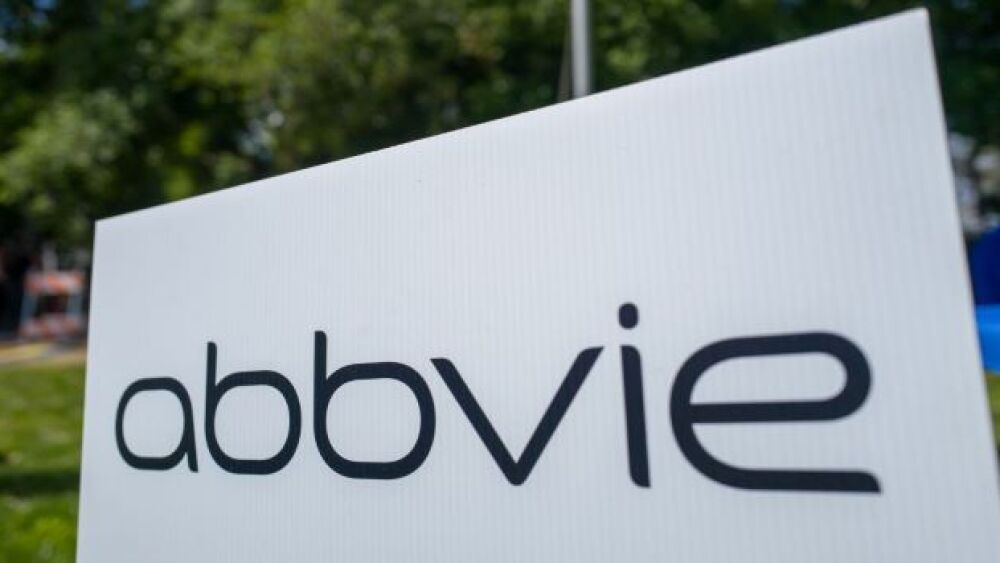AbbVie is off to a strong start for 2022 driven by success from Skyrizi and Rinvoq, as well as the company’s neuroscience platform. Abbvie also won FDA approval for a new indication for Rinvoq.
Smith Collection/Gado/Getty Images
AbbVie is off to a strong start for 2022, driven by success from Skyrizi and Rinvoq, as well as the company’s neuroscience platform that includes its depression treatments and its three-pronged approach to migraine.
Friday afternoon, AbbVie announced the U.S. Food and Drug Administration approved Rinvoq (upadacitinib), its JAK inhibitor, for the treatment of adults with active ankylosing spondylitis (AS). AS is a rare form of arthritis that causes spine pain and stiffness.
The FDA will now allow patients who have had an inadequate response or intolerance to one or more tumor necrosis factor (TNF) blockers to be given an oral 15 mg dose once daily. The approval is supported by data from the Phase III Select-Axis 2 trial and the Phase II/III Select-Axis 1 trial. Today’s announcement is AbbVie’s fifth indication for RINVOQ in chronic immune-mediated diseases.
Friday morning, AbbVie CEO Richard Gonzalez touted the momentum the company has seen across these products and portfolios during the first quarter. During the Q1 conference call, Gonzalez said Skyrizi and Rinvoq will become important revenue drives for the company, particularly as its cash cow Humira loses market share in Europe and the United States due to increasing competition from novel treatments and biosimilars.
He also noted the company’s three migraine drugs have become key revenue drivers. With the migraine market expected to double in size, Gonzalez said “there’s significant headroom” for growth.
“This is a really exciting time for AbbVie,” Gonzalez said. “Our momentum combined with ramping contributions from new products and new indications will drive accelerating revenue and EPS growth through the rest of the year.”
With ongoing clinical studies of Rinvoq and Skyrizi, Gonzalez said the revenue stream for the two drugs is anticipated to increase. Earlier this year, Rinvoq picked up a new designation when it was approved by the U.S. Food and Drug Administration for the treatment of moderate to severe atopic dermatitis in adults and juveniles 12 years of age and older who have not responded to previous treatment options or when other options are not advised. Then, last month, the FDA greenlit Rinvoq as a treatment for adults with moderately to severely active ulcerative colitis (UC) who have had an inadequate response or intolerance to one or more tumor necrosis factors (TNF) blockers.
Rinvoq could receive additional approval following data from the Phase III U-EXCEL study on Crohn’s disease. The study showed Rinvoq hit the mark with both primary endpoints of clinical remission and endoscopic response, as well as most key secondary endpoints.
During the first quarter, the FDA extended the review period for Skyrizi (risankizumab) for the treatment of moderate to severe Crohn’s disease by three months. The decision was made so the regulatory agency could review additional data submitted by AbbVie, including information about the on-body injector.
In neuroscience, the company is hoping to secure an additional indication for Vraylar (cariprazine). The company submitted a supplemental New Drug Application for the adjunctive treatment of the major depressive disorder (MDD). Vraylar has previously been approved for the treatment of bipolar disorder and schizophrenia. The latest submission to the FDA was based on trial results that showed clinically and statistically significant improvement in the Montgomery-Asberg Depression Rating Scale in patients with MDD treated with Vraylar and an antidepressant.
In migraine, the company anticipates potential approval of a new indication for Qulipta (atogepant), an oral calcitonin gene-related peptide (CGRP) receptor antagonist. Data from the Phase III Progress study showed Qulipta met its primary endpoint of statistically significant reduction from baseline in mean monthly migraine days compared to placebo. AbbVie hopes the data will expand the use of Qulipta to include preventive treatment of chronic migraine.
For the first quarter, worldwide revenues were $13.5 billion, a 5.4% increase on an operational basis. Immunology, a key area for AbbVie, generated $6.141 billion in revenue, an 8.1% increase on an operational basis. Humira, which has been a powerhouse delivering $20 billion in revenue for several years, lost some ground, but still managed to bring in $4.7 billion during the first quarter. Humira sales were down 2.7% on a reported basis. Humira’s biggest slide was overseas, where biosimilar competition is increasing. Net revenue internationally was $743 million, a decrease of 22.6% on a reported basis.
Skyrizi and Rinvoq, which are seen as successors to Humira, posted strong gains. Net revenues for Skyrizi were $940 million, an increase of 63.7% on a reported basis. Rinvoq sales across the globe were $465 million, an increase of 53.6% on a reported basis.
Global revenue for the neuroscience division was $1.4 billion, a 21.1% increase on an operational basis. Vraylar generated $427 million during the quarter and Ubrelvy, another migraine drug, posted $138 million in sales. Revenue for therapeutic Botox was $614 million, a 16.6% increase on an operational basis, the company said.
AbbVie did see a decrease in global net revenue from its hematologic oncology portfolio. Revenue was 1.6 billion, a decrease of 1.6% on a reported basis. Sales of Imbruvica slid 7.4% to $1.17 billion. Venclexta saw a 16.9% jump to $473 million.
Featured Jobs on BioSpace





